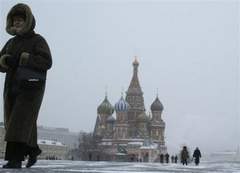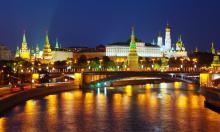Moscow eats up energy as temperatures drop sharply
According to meteorological forecasts, Moscow will be freezing for another week
Moscow looks very strange these days, for almost a week of the extremely freezing weather. The sun shines brightly, and just a handful of passers-by and cars can be seen in the streets. People tried to cut their exposure to freezing air since a 10-minute walk to metro could be a frightful experience for the skin on the face. The metro underpasses looked dark and desolate; newsstands were gone due to power cuts. “Free attendance” rules were declared in some schools; others were shut down altogether. “We have issued an order to allow parents to make a decision at their discretion whether children should attend a school when outdoor temperatures drop to minus 24 degrees Celsius and lower levels,” said Alexander Gavrilov, a spokesman for Moscow's department of education. 
According to press service of the United Energy System of the Russian Federation (RAO UES), the Russian grid, on Tuesday night the Moscow energy system's capacity load reached a historical high – 15,329 megawatt. However, a new record was set by Wednesday night after power consumption went up to 15,760 megawatt due to continuing decrease of temperatures.
On Wednesday at 15.00 the Moscow energy authorities switched to energy saving mode to minimize the supply of additional electricity to industrial facilities in Moscow and Moscow region. The emergency shutoff plans were agreed with about 250 companies, according to a statement by Marita Nagoga, chief of the media liaison department of RAO UES. The energy authorities also called on city residents to refrain from using certain household appliances such as kettles, coffee grinders, washers, and heaters during the peak power consumption period in the morning and at night.
The Moscow authorities also took steps to save energy throughout the city during the cold spell. Pursuant to a decree of the city emergency committee for coordination of actions during the period of subfreezing temperatures, power supply to nearly 4 thousand facilities was to shut off.
“We are talking about markets selling clothes and construction materials, and kiosks that sell hot or reheated eats. Nothing terrible will happen if we shut off power supply to such facilities. The measure will be effective for several days only. Weatherwise the situation will hopefully improve by Sunday,” said Vladimir Malyshkov, head of the city’s consumer market and services department.
The city authorities also decided to cut power supply to major construction sites. Trolley cars were to be replaced by buses where deemed feasible. Trolley cars were replaced by buses not only for power saving purposes. A number of conducting wires across the city were reported to have been broken down as temperatures dropped to minus 28 degrees Celsius on Tuesday night. Repair teams were fixing equipment at 12 different locations all night long.
A large-scale accident occured in the town of Tomilino, the Moscow region, two days ago due to a water line breakdown at a boiler room. As a result, about a thousand residents of 44 apartment buildings and 54 inmates of a mental hospital had to do without hot running water and heating appliances. “The authorities of the Lyubertsy district have declared a state of emergency in the area, thus far no evacuation plan has been put into force,” said a source in the Ministry of Emergency Situations at the time of going to press.
“Casualties” were light in the megalopolis during the freezing hours of the night with only 16 people taken to hospital due to hyperthermia. One person was reported to have died. The police were advised to “treat the homeless in a humane way and render them help” prior to the cold spell. In accordance with orders, the police at the metro stations were told not to throw the homeless out to the street. The police were also recommended to escort the homeless to hospitals and shelters.
Despite the subfreezing temperatures, the situation on the Moscow roads was normal, according to a duty officer of the city traffic police. The number of vehicles on the city roads decreased by a third, according to the same source. Even those who usually disregard the warnings of the traffic police got the message this time around - just a handful of drivers who keep their cars at outdoor parking lots could start them up yesterday morning.
AP photo
Discuss this article on Pravda.Ru English Forum
Subscribe to Pravda.Ru Telegram channel, Facebook, RSS!



